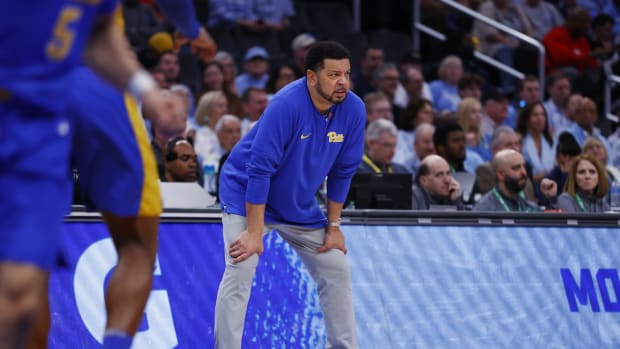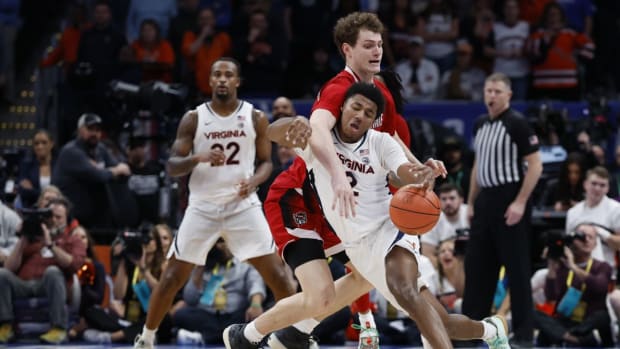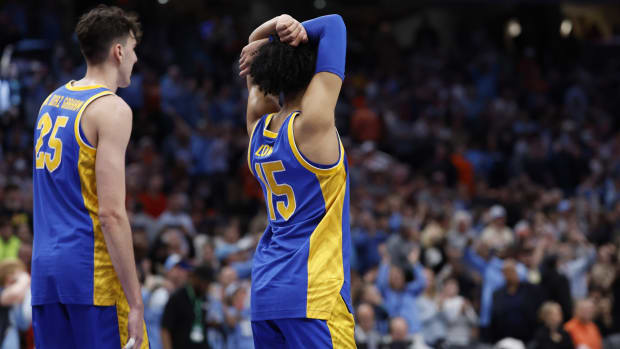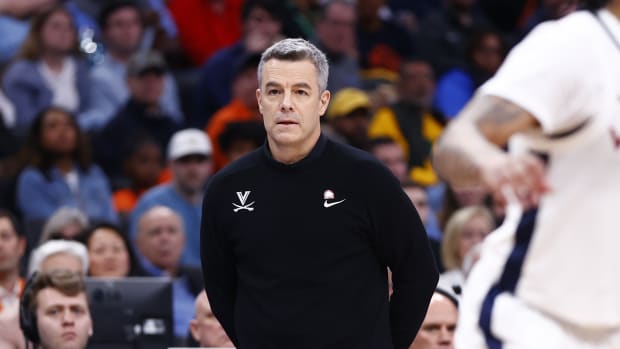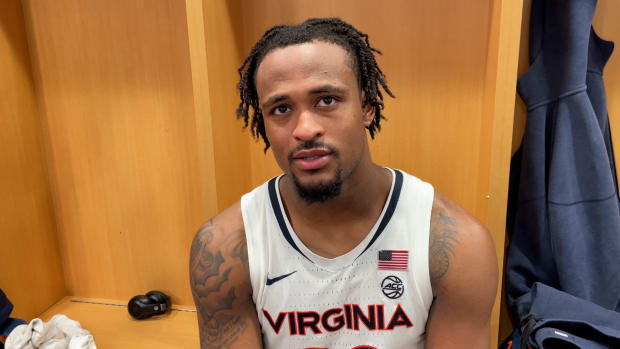Detroit Mercy Star Antoine Davis Out to Prove There's Not Just One Way to the NBA
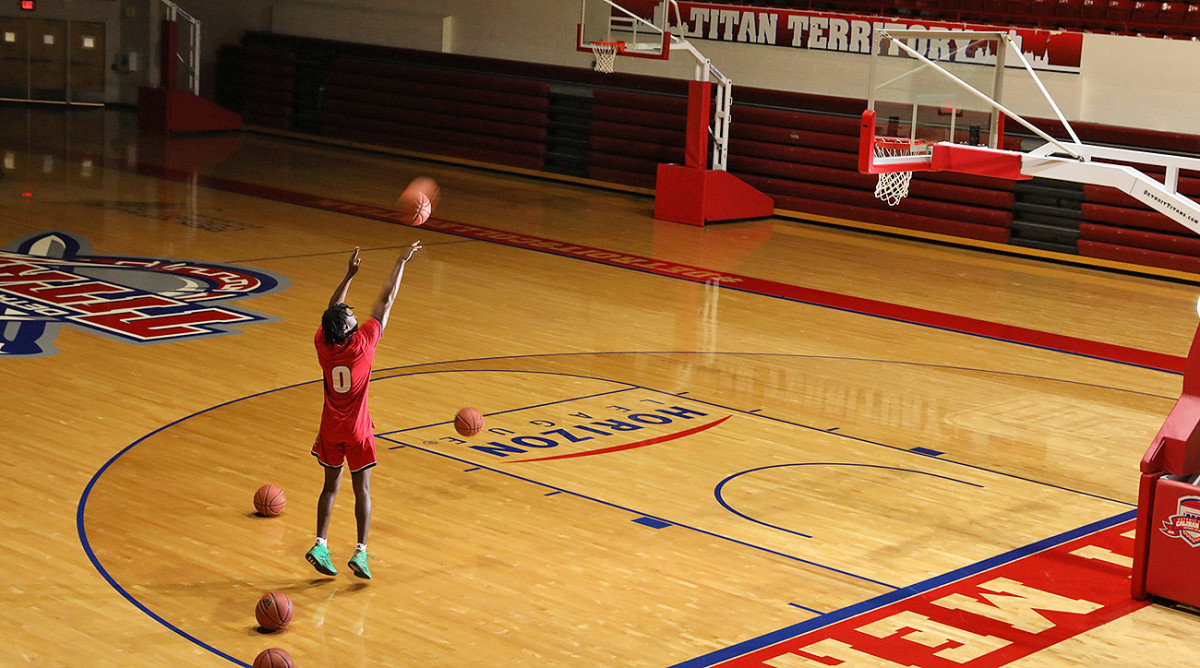
This story appears in the June 3–10, 2019, issue of Sports Illustrated. For more great storytelling and in-depth analysis, subscribe to the magazine—and get up to 94% off the cover price. Click here for more.
Uncrustables, they’re called: premade, prepackaged peanut butter and jelly sandwiches that come 18 to a box. Each one packs 320 calories, 17 grams of fat and enough sugar to give a large horse diabetes. There is, of course, no accounting for taste, but these snacks will not be winning any James Beard Awards. Yet Uncrustables figure prominently in the locker, diet and future of Antoine Davis.
You’ve heard of the “freshman 15,” the weight first-year college students often pack on unintentionally after months of dining hall food and late-night pizza runs? Adding 15 pounds is Davis’s goal. By the time his sophomore season at Detroit Mercy starts in the fall, he wants—desperately—to augment his 6-foot frame. So he is eating enough Uncrustables and other snacks to bulk up a body that gets lost in a sweatshirt. “I like them O.K.,” Davis says of the sandwiches, in a voice that barely registers above a whisper. “But when I see that they help me add weight, I like them more.”
Playing at 155 pounds, Davis dazzled as a freshman. While he received only a small fraction of the attention of Duke behemoth Zion Williamson, the shooting ( . . . and shooting and shooting . . . ) guard averaged 26.1 points, third-highest in Division I. (Williamson put up 22.6.) Davis’s 132 three-pointers surpassed the freshman record of 122 set in 2006–07 by the comparably sized Stephen Curry of Davidson. He was also the first freshman to be named to the All-Horizon League team since a Butler forward a decade ago, Gordon Hayward.
Davis is a playmaker who can beat the defense off the dribble. But truly, he is a shooter. His release is blindingly quick, his range hard to quantify. Last season he connected on 38.0% from deep, hitting multiple threes from the t of the Titans’ half-court logo, 26 feet out. “They were good shots,” he asserts. “Even at my age [20], I’ve noticed that opinions are changing about that. It’s like Damian Lillard. If you prove you can make it, distance doesn’t matter as much.”
His shooting has made Davis both a minor cult figure and a YouTube sensation. And while his season ended in early March, his range and accuracy have remained on vivid display each day since then at 8,295-seat Calihan Hall. Positioned in front of a machine that feeds him basketballs—AirPods in his ears, eyes on the target, braids bouncing with each release—Davis orbits the court. Almost invariably, the ball snaps the net. On this day he went through a typical shooting workout, hoisting 5,000 jumpers. At different intervals, he makes 32, 37 and 29 consecutive three-pointers. Told of this later, Davis smiles and shrugs. His high is 101.
Davis is a realist. He recognizes that, as the three has become the most important shot in basketball, the NBA will accommodate an accurate, if undersized, marksman with a hair-trigger release, able to create his own shot. Curry is the most obvious example. But the Sons of Steph now include the Hawks’ Trae Young (6' 2", 180 pounds) and Purdue’s Carsen Edwards (6-feet, 200), a potential first-round pick in the draft on June 20. Why, Davis wonders, can’t he be the next?
But he also knows this: It’s not going to happen if he’s a buck fifty-five, a Smart car among SUVs. How are you going to manage screens when you weigh roughly half a Zion? How are you to defend another shooting guard when you’re spotting him 50 pounds? “I have to get bigger, no doubt,” says Davis. “That’s the challenge.”
He’s attacking that task this summer by working out and eating everything that isn’t a mushroom or a stalk of broccoli. If he succeeds—both in helping to rebuild the Titans’ program and in playing professionally—he’ll write one of the great basketball family redemption stories.
On Sept. 10, 2000, Bob Knight was fired as Indiana’s basketball coach after 29 seasons and three national titles, completing one of the great downfalls in sports. What was already a convulsive period in Bloomington only intensified when the school administrators offered the job to one of his assistants. Mike Davis was everything Knight wasn’t. Young. Warm. Inexperienced. Black. Knight even offered to pay Davis’s $95,000 salary if he declined the job in solidarity. A few days before his 40th birthday, Davis refused Knight’s offer and became the Hoosiers’ first African-American head coach in any sport.
For Davis, it was, at once, a dream job and a no-win job. He ran a clean program. He recruited capably. In 2002 he led the Hoosiers to the NCAA championship game, where they lost to Maryland 62–54. His in-game coaching could be shaky, but, beyond that, in many precincts, he committed the unpardonable sin of not being Bob Knight. Indiana dismissed him after six seasons.
Since then, Davis’s career trajectory has not exactly been upward. He spent six years leading Alabama-Birmingham, taking the team to the NCAA or NIT tournament in four of them, before he was fired. Davis then went to Texas Southern and was there six seasons as well, going 115–89. “I wish I had started small and built up to a job like Indiana,” Davis says with trademark candor. “Instead it was the other way around.”
But while he was coaching, Davis was moonlighting on what was equally a science project and a behavioral research experiment. Shortly after it came out in 2009, Davis read The Talent Code by Daniel Coyle, which makes the case that greatness is not a divine gift but rather the result of relentless practice.
Davis thought he could apply Coyle’s doctrines, add some of his own beliefs and turn his youngest son into a prodigy. It wasn’t that Antoine loved basketball or was naturally gifted. But Mike—himself a creature of routine who starts each day with 500 pushups and a cold shower—had a vision and designed a training program for Antoine, predicated on some intriguing principles:
• Size and speed are overrated. “It’s all about the skills and technique,” says Mike. “Too many young athletes are the biggest or the fastest and we confuse that for being the best. One day, you won’t be the biggest and then the question becomes, How skilled are you?”
• Passion is overrated. “Being passionate about your business is great,” says Davis. “But how good is your business model? That’s more important to whether you make it or not.”
• Repetition is everything. “With Antoine,” says Davis, “it was about getting to the point where shooting a basketball came as naturally as tying his shoe.”
Antoine was 12 when he started training, though it took him a few years to warm up to the idea. Fortunately, Mike had a lab partner, as it were: John Lucas, whom he coached in the 1990s when they were both with the CBA’s Wichita Falls Texans. When Davis took the job at Texas Southern, in Houston, he reconnected with Lucas, who lived nearby. An impossible-not-to-like basketball/life coach, Lucas took particular interest in Antoine. Lucas’s own son, John Lucas III, was 5' 11" and weighed 166 pounds, but he made the NBA and played for six teams between 2005–06 and ’16–17.
Paid a monthly fee to work with Antoine, Lucas put him through a daily battery of shooting, conditioning and ballhandling drills. During the summer, when NBA players gravitate to Lucas’s facilities to work out, he invited Antoine to play in the pickup games. Suddenly, the 14-year-old was running full-court with JaVale McGee, Thaddeus Young and DeAndre Jordan. And damn if the kid didn’t hold his own. “When DeAndre Jordan is telling you to shoot, you shoot,” says Antoine. “And you better make it.”
In part to continue the partnership with Lucas, the Davis family decided to home-school Antoine, who played on a high school team called the Homeschool Christian Youth Association. While he scored 23.0 points a game as a junior, most of the recruiting services overlooked him; he didn’t rank among the top 300 prospects in the country. But Houston coach Kelvin Sampson (who had succeeded Mike Davis at Indiana, incidentally) noticed the hometown star and offered Antoine a scholarship. Happy to stay local, Antoine signed a letter of intent in November 2018.
Last June, Detroit Mercy (formerly the University of Detroit) offered Mike Davis the top job. The Titans were coming off consecutive eight-win seasons. A commuter school nestled in a threadbare neighborhood of a struggling city, the program has a considerable basketball history. But “Spencer Haywood once played here,” or “Dick Vitale once coached here,” is not much of a recruiting pitch for kids born in 2001.
Yet Davis reckoned that if he could rebuild Detroit Mercy he could, at 58, rebuild his career as well. And the process could be accelerated if he could rely on the skills of the sharpshooter who lived under his roof. “It was Antoine’s choice,” says Mike. Part of his pitch: He would pay Antoine’s tuition, so if his son wanted to transfer he would, under NCAA rules, be considered a walk-on and wouldn’t have to sit out a year.
Antoine chose to join his dad, and Sampson let him out of his commitment. “I just kept thinking how much fun it would be do this as a family,” he says. “It just seemed like the right move.”
When the Davis clan arrived in Detroit, the team was down to four players. Mike signed 10 during the first two weeks of August, holding open tryouts, combing the NCAA transfer portal and searching for fifth-year seniors eager to play for one more season.
He did, however, have one of the most skilled freshmen in the country. In his first game Antoine dropped 32 points on Western Michigan, then followed with 30 against Temple. And the scoring bursts continued through the season. In a win over Wright State, Davis had 48, making 10 of 15 threes. (At one point, the score was Wright State 45, Antoine Davis 43.) In the finale, Davis erupted for 30 points against Northern Kentucky, the conference champ.
While Detroit Mercy finished 11–20, Houston made the NCAA tournament. Antoine has no regrets. The hardest part? “[My dad] probably got on me more than others.” And there’s this: “It was weird calling him ‘Coach,’ but also weird calling him ‘Dad’ so I mostly just said, ‘Hey.’ ” When situations became tense, Antoine had a middleman in his brother Mike Jr., 34, a Titans assistant coach who lives in the same downtown apartment complex as Antoine.
Mike Jr., who played for his father at UAB, wishes he had been a “project” too, but harbors no bitterness. “We didn’t have the knowledge back then,” he says. “We would shoot 500 shots and think it was a hard workout. ’Toine does 5,000.”
After the season Mike Sr. had his video coordinator, Will Finch, compile a sizzle reel of each of Antoine’s 132 three-pointers. Early on in the footage, multiple defenders converge on Antoine, who is often shooting over four arms. “You wonder how ’Toine would do,” Mike says to himself, “if he wasn’t getting double-teamed every time.”
As the clips—and thus the season—progress, defenders are playing Antoine with increasing physicality. They nudge him as he pops off picks and screens. They bump his hip as he shoots. They don’t give him space to land after he releases. Of the top 50 scorers in D-I, Antoine was 45th in free throws attempted: the price you pay for weighing 155. NBA scouts who sat in the stands arrived at the same conclusion. As one from a Western Conference team puts it, “Great scorer. Great kid. Good handle. Needs to be bigger.”
So it is that for all the thousands of jumpers he hoists each day, the bulk of Davis’s work—pardon the pun—happens away from the court. It’s the time spent in the weight room, where he lifts four times a week. It’s the time he spends swigging protein shakes. Most of all, it’s the time he spends chewing and swallowing.
“We’re doing this in reverse,” says Mike Jr. “Most kids have size and strength, get drafted on that, and have to build skills. Antoine has the skills. Now he needs to build size and strength. I know which position I’d rather be in!”
Nick Wilson, Detroit Mercy’s director of strength and conditioning, is overseeing Operation 170, as the quest for Antoine’s target weight is known. “But it’s basically, eat, eat and eat some more,” says Wilson. “Later in the summer, we’ll get a daily calorie count, probably 4,000 to 5,000. But right now, I tell Antoine, ‘You’re eating to put on size, not to not be hungry.’ For most people it’s a neat problem to have. Eat constantly and the more you put on, the better.”
Antoine’s weekly trip to the scale in the Detroit Mercy weight room has become an anticipated event, attracting a ring of teammates, friends and, of course, Dad/Coach/Hey. By early May he was up to 162, having added almost a pound a week since the season ended.
The kid is already getting sick of peanut butter and jelly. Tired of the chocolate milk he’s been encouraged to drink by the tankard. Weary of the pancakes for breakfast, the pizza for lunch and even the steaks for dinner. But if all this helps Antoine Davis resurrect his dad’s career and take his own game to the next level, it will be worth the weight.




